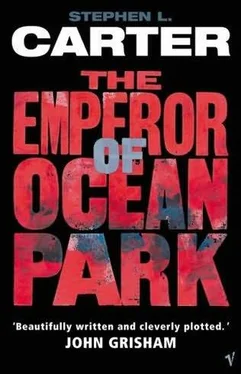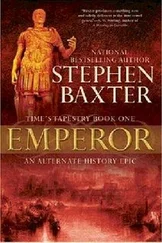Stephen Carter - Emperor of Ocean Park
Здесь есть возможность читать онлайн «Stephen Carter - Emperor of Ocean Park» весь текст электронной книги совершенно бесплатно (целиком полную версию без сокращений). В некоторых случаях можно слушать аудио, скачать через торрент в формате fb2 и присутствует краткое содержание. Жанр: Криминальный детектив, на английском языке. Описание произведения, (предисловие) а так же отзывы посетителей доступны на портале библиотеки ЛибКат.
- Название:Emperor of Ocean Park
- Автор:
- Жанр:
- Год:неизвестен
- ISBN:нет данных
- Рейтинг книги:3 / 5. Голосов: 1
-
Избранное:Добавить в избранное
- Отзывы:
-
Ваша оценка:
- 60
- 1
- 2
- 3
- 4
- 5
Emperor of Ocean Park: краткое содержание, описание и аннотация
Предлагаем к чтению аннотацию, описание, краткое содержание или предисловие (зависит от того, что написал сам автор книги «Emperor of Ocean Park»). Если вы не нашли необходимую информацию о книге — напишите в комментариях, мы постараемся отыскать её.
Emperor of Ocean Park — читать онлайн бесплатно полную книгу (весь текст) целиком
Ниже представлен текст книги, разбитый по страницам. Система сохранения места последней прочитанной страницы, позволяет с удобством читать онлайн бесплатно книгу «Emperor of Ocean Park», без необходимости каждый раз заново искать на чём Вы остановились. Поставьте закладку, и сможете в любой момент перейти на страницу, на которой закончили чтение.
Интервал:
Закладка:
“It’s not about what he did,” I would answer patiently, trying to explain for her lay and partisan ear a judge’s duty to avoid even the appearance of impropriety, only half believing it myself, given some of the characters who have managed to hang on to their seats on the federal bench, including the Supreme Court. “It’s about hiding what he did.”
“That’s ridiculous!” she would shoot back, unable in those days to wrap her voice around the rougher forms of dismissal so characteristic of our country’s increasingly vulgar discourse. “They were out to get him all along, and you know it. ” As though having real enemies was a defense against any charge of wrongdoing. Or as though the fact that Jack Ziegler was about to stand trial for a bewildering variety of offenses at the time of what the press called the secret lunches was a triviality; or as though the fact that my father and Uncle Jack were apparently still in touch when his old roommate was a fugitive from justice was beside the point. After all, Uncle Jack was ultimately acquitted of nearly all the charges, and, if he was truly a fugitive, he was a fugitive only from the justice of liberals who hated him for his perhaps over-enthusiastic prosecution of the Cold War: so quoth the editorial page of the Journal.
And if whispers along the legal grapevine spoke of jury tampering, of bribed or intimidated witnesses, of the felicitous disappearance of crucial pieces of evidence, well, there are always whispers.
Kimmer, exhausted after taking the red-eye from San Francisco and then collecting our son and training down here, dozes on my shoulder in the limousine as we head for the cemetery out in Northeast Washington, a few blocks north of Catholic University. Bentley snuggles nervously against her other side, his gray suit hanging loosely on his tiny frame, because frugal Kimmer believes in buying children’s clothes two or three sizes ahead. I gaze at my wife’s profile. In her simple black dress, unadorned except by subtle gold earrings and a single strand of pearls, she is arresting. My wife is tall and quite intensely handsome, with a long, thoughtful face, a bold, aggressive chin, engaging brown eyes, a broadly prominent and very kissable nose, and soft, encompassing lips that I adore. Even her steel-rimmed glasses seem sexy: she is constantly slipping them on and off, nibbling on the ends, twirling them as she talks on the phone, all of which I find enthralling. I have loved looking at her since the day we met. She is, by her own description, big-boned, with wide shoulders and broad hips that have finally, after years of sometimes wild fluctuations, settled into a roundness she finds comfortable. Her skin is a shade or so lighter than mine, reflecting her upper-class Jamaican heritage. She wears her dark brown hair in a defiant short Afro, as if to contradict the stern expectations of her clan (where hair is always permed and often colored), and her slow smile and quick temper hint at a passionate core. There is a lushness to Kimmer, but a stolidity as well. She carries herself with a sensual dignity that simultaneously draws you in and sets firm limits. She keeps the world off balance, and is burdened by a raging desire for fairness. Her intellect is quick and wide-ranging. Given the opportunity, Kimmer would be an excellent judge. Nobody really wants to mess with her: not the opposing lawyers she encounters in her work, not the friends she collects with such disturbing ease, and certainly not I.
For example, I have not lately challenged my wife about her frequent trips to San Francisco, where she is ostensibly doing what lawyers call “due diligence,” reviewing the financial records of a software company that her firm’s most important client-a local leveraged-buyout group called EHP, formerly Elm Harbor Partners-plans to acquire. She would shoot me down if I mentioned it: Kimmer goes where EHP sends her, and if EHP wants her in California, well, California, here she comes. It is the strength of her relationship with EHP that earned her the quick partnership she pretends to disdain, for EHP asked for her by name at Newhall amp; Vann almost from the day she walked in the door. And EHP is, formally, the client of Gerald Nathanson, one of her firm’s most influential partners, a very married man with whom my very married wife is, or is not, having an affair.
Maybe the furtive telephone calls and the long, unexplained disappearances from her office are mere coincidences. And maybe my father is about to leap from his casket and do the funky chicken.
Now, as my jealousy flames afresh, Kimmer unexpectedly intertwines her fingers with mine, where they lately have spent little time. I look over at her in surprise and notice the start of a smile on her face, but she never looks in my direction. Bentley is now fast asleep, and Kimmer’s free hand is absently stroking his curly black hair. Bentley sighs. They have something special, these two, some genetically mysterious mother-son connection that excludes me, and always will. In this strange, broken world, men often love their wives as much, or as little, as they do their children, but, for women, biology seems to trump personal choice: they may love their husbands, but their children come first. Were the balance otherwise, I doubt that the human race would have survived. Indeed, I suspect that one reason I have remained true to Kimmer, whatever she has done, is that I know that if we ever parted she would take Bentley with her. Even though I spend far more time with our son than she does, she could not bear to let him go. I steal another glance at Kimmer, then look up at Addison, cuddling shamelessly with his white girlfriend in the opposite seat, wondering, as I have so often, if the mutual passions in their very different natures have ever led to mutual sparks.
Addison is perhaps an inch shorter than I am, and broader through the shoulders, but it is muscle, not fat; although not really an athlete, he has always kept himself in good shape. His face is both friendlier and more handsome than mine, his brows less intrusive, his eyes more evenly set, his demeanor more calm and open. Addison has wit and style and grace, none of which I possess. When we were children, Addison was charming and fun and I was merely a grind, and I always had the sense, at parties, on vacations, in church, that my parents were more excited about introducing my brother to their friends than introducing me. In our school days, I would arrive in each classroom four years after Addison left, and I would achieve better grades, but the teachers would always be persuaded that he possessed the better brain. If I brought home an A, my father would nod, but if Addison brought home a B, he gained a slap on the back for his effort. As a child, I read over and over the story of the prodigal son, and was invariably incensed by it. I argued about it with Sunday-school teachers galore. When we read the parable of the lost sheep, I told my teachers I thought most people would keep the ninety-nine sheep rather than go searching for the missing one. The answer would be an angry glower. Adulthood changed nothing. That I would remain married to the same difficult woman my father accepted as a matter of course, but each time Addison introduced a new and evermore-compliant one, the Judge would smile and put an arm around his shoulders: “So, son, ready to settle down at last?” Any answer my brother offered seemed to satisfy. And my father always seemed a good deal less impressed by my tenure at one of the nation’s best law schools than by Addison’s eerie ability to strike gold wherever he digs.
Nowadays, my older brother has become a type common to the darker nation: smart, ambitious, well educated, utterly dedicated to the romanticism of the long-shattered civil rights movement, living on the fringes of what remains. Racial unity has long ago disappeared, as has the larger nation’s commitment, if it existed, to the basic principles of the movement. Dozens of organizations claim the mantle of Wilkins and King and Hamer, along with an army of academics, a brace of television commentators, and every group of newly anointed victims of oppression, not one of which can resist pointing out the astonishing similarities between its own endeavor and the black freedom struggle. As for Addison, he has played the circuit like the tennis pro my father once hoped he would be: after the University of Pennsylvania, a post at a community-development corporation in Philadelphia, followed by a mid-level staff position for one of the state’s congressmen, a few years in Baltimore at the national office of the NAACP, a high position in the Democratic National Committee, a desk at the Ford Foundation, key advisory spots in three national political campaigns, a semester as a visiting scholar at Amherst, a stint at the ACLU, a couple of years at the Education Department under Clinton, that Ford Foundation desk again, a semester at Berkeley, a year in Italy, six months in South Africa, a year in Atlanta, all three funded by a Guggenheim as he works on his yet unfinished great book on the movement. In unguarded moments, my brother whispers hopefully of the MacArthur award that will certainly never come, and so, forced to earn a living, Addison has transformed himself into a man of the new century, hosting a radio call-in show five nights a week in Chicago, joyfully intimidating guests as he proclaims to the world-or at least to his audience-his own orthodox liberal views on everything from the death penalty to gays in the military, insisting at least twice each night, even now, that George W. Bush was never really elected President, peppering his commentary with mountains of Biblical quotations, some of them accurate, along with alleged gleanings from Mahavira, Chuangtzu, and other sages with whom his listeners are unlikely to be familiar. I suppose one would call the slant of his religiosity New Age, for he mixes in what he finds useful and discards what he dislikes. He lives in a small and aging but nevertheless elegant townhouse in Lincoln Park, sometimes alone, sometimes with any of his several girlfriends, most of them white, waiting for the next big thing to come along to add to his resume. Pressed, he will admit that he was married once or twice, but he invariably adds that he has come to harbor doubts about the institution, and is therefore glad that his didn’t last.
Читать дальшеИнтервал:
Закладка:
Похожие книги на «Emperor of Ocean Park»
Представляем Вашему вниманию похожие книги на «Emperor of Ocean Park» списком для выбора. Мы отобрали схожую по названию и смыслу литературу в надежде предоставить читателям больше вариантов отыскать новые, интересные, ещё непрочитанные произведения.
Обсуждение, отзывы о книге «Emperor of Ocean Park» и просто собственные мнения читателей. Оставьте ваши комментарии, напишите, что Вы думаете о произведении, его смысле или главных героях. Укажите что конкретно понравилось, а что нет, и почему Вы так считаете.












